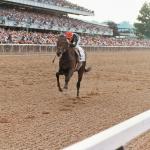
Afleet Alex: Amazing Athlete Earned Improbable Preakness Win

When the unbeaten Justify crossed the finish line first in the Preakness Stakes at Pimlico, the reactions from racing fans and handicappers were mixed.
Although the Kentucky Derby Presented by Woodford Reserve winner was able to get the job done and move one step closer to sweeping the Triple Crown, he had to work surprisingly hard to prevail, leading some to question whether he’ll be vulnerable in the Belmont Stakes on June 9, the final leg of the Triple Crown. The fact that Justify was all-out to win the Preakness by a half-length – with the top four finishers separated by just a length at the finish – was quite a contrast to the remarkably easy seven-length Preakness victory achieved by American Pharoah on his way to Triple Crown glory in 2015.
Indeed, the two races presented completely different visuals. The sight of American Pharoah powering away from his Preakness rivals gave hope that the Triple Crown drought would finally come to an end, which is exactly what happened. In contrast, Justify was losing ground at the finish of the Preakness, and had the race been a few strides longer, he likely would have been beaten by the late-charging runner-up Bravazo.
But while the visuals seem to suggest that American Pharoah was finishing strongly at the end of the Preakness and Justify was tiring, an analysis of the fractional times from each race paints a different picture. Since both colts won the Preakness in gate-to-wire fashion, let’s take a look at the raw fractions posted by each horse:
|
Horse |
¼-mile |
½-mile |
¾-mile |
1-mile |
1 3/16 miles |
|
Justify |
:23.11 |
:47.19 (24.08) |
1:11.42 (24.23) |
1:36.10 (24.68) |
1:55.93 (19.83) |
|
American Pharoah |
:22.90 |
:46.49 (23.59) |
1:11.42 (24.93) |
1:37.74 (26.32) |
1:58.46 (20.72) |
As can quickly be seen, Justify and American Pharoah achieved their Preakness victories in very different ways. American Pharoah went faster than Justify over the first half-mile (:46.49 vs. :47.19), but Justify caught up after three-quarters of a mile and traveled more than 2 ½ seconds faster than American Pharoah over the final 7/16ths of a mile, getting the distance in :44.51 seconds compared with :47.04 for American Pharoah. In the final three-sixteenths of a mile alone, Justify finished nearly a second faster than American Pharoah.
So why was American Pharoah able to win his Preakness in such decisive fashion if Justify arguably turned in the better performance? Two factors: Competition and track conditions. You can make a case that American Pharoah faced an easier field in the Preakness than Justify did – American Pharoah’s main rivals, Dortmund and Firing Line, failed to seriously threaten at any point, leaving the longshots Tale of Verve and Divining Rod to round out the top three behind American Pharoah. In contrast, Justify had to defeat the champion Good Magic in a prolonged duel for the lead and then hold off the accomplished graded stakes winner Bravazo in the final strides.
As for the track conditions, both Justify and American Pharoah won the Preakness over sloppy tracks, but whereas Justify benefited from racing over a sealed track (which is packed down tight), American Pharoah won the Preakness over an unsealed racing surface that had been hit by a torrential downpour just minutes before the race. Thus, the track was playing much slower than it would have been had there been time to seal the surface, which is reflected by the fact that American Pharoah received higher speed figures than Justify despite his slower final time:
American Pharoah’s Preakness: 102 Beyer Speed Figure, 100 BRIS Speed Figure
Justify’s Preakness: 97 Beyer Speed Figure, 98 BRIS Speed Figure
However, even if you attempt to adjust the raw fractional times to account for American Pharoah racing over a slower track, Justify still comes out as the faster horse over the final 7/16ths of a mile. In my opinion, this means two things: First off, it means that Justify was facing tougher competition that made his margin of victory less impressive. Secondly, it means that Justify’s performance may have been more impressive than he is being given credit for, considering that he finished as fast as he did after engaging Good Magic in a race-long battle for supremacy, whereas American Pharoah secured a clear lead in his Preakness and was never challenged.
In any case, we’ll get another chance to compare the two colts when Justify bids for glory in the Belmont Stakes, though if he can match his predecessor with a sweep of the Triple Crown, fractional and final times will take a backseat as racing celebrates its 13th Triple Crown winner.